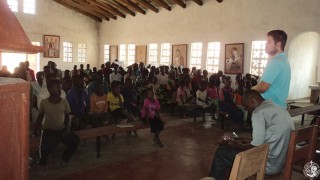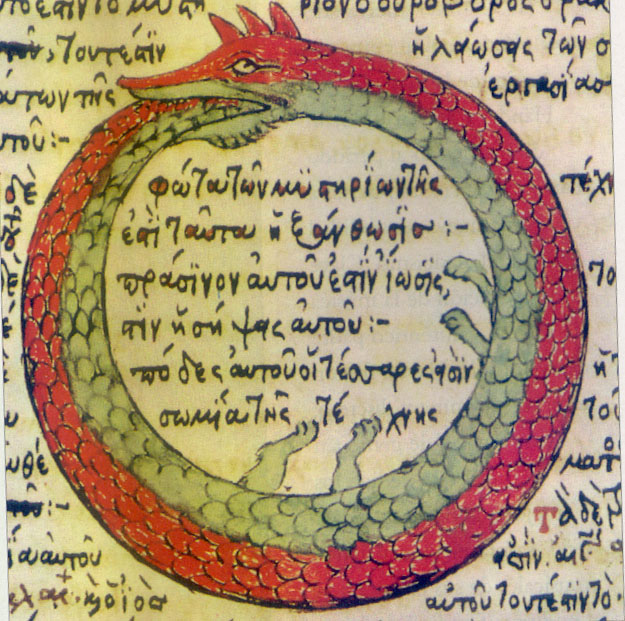C.
S. Lewis once said of the pagans that they were ‘pre-Christians’ (http://www.ancientfaith.com/podcasts/biblesnarrative/the_temple_as_myth);
that is, peoples who had been made ready to receive the Gospel.
What
may one say, then, of Southerners, with their unique mix of evangelical
Protestant Christianity, pre-modern tilth-mindedness (agrarianism), hierarchy,
love of classical Greek and Roman literature, etc.?
A Southerner is ‘pre-Orthodox’.
For
there are many points of agreement between Orthodox teaching and the Southern
way of life.
He needs only to step into the Holy Orthodox Church to experience the
fulness of what he has known but in part (and he has done well to know that
much in this age of confusion).
Below
we will see two other ensamples of their agreeing, with respect to the view of
the natural world as being full of God’s presence and with respect to the need
to purify one’s passions before he may see this presence of God in His creation.
We
will begin by quoting a Father of the Church named Nikitas Stithatos, a
disciple of St Symeon the New Theologian:
7. Those who 'cleave to the Spirit' (Gal. 5:25) and are
totally committed to the spiritual life live in accordance with God's will,
dedicated to Him as were the Nazirites (cf. Num. 6:2-8; Judg. 13:5). At all
times they labor to purify their soul and to keep the Lord's commandments,
expending their blood in their love for Him. They purify the flesh through
fasts and vigils; they refine the heart's dross with tears; they mortify their
materialistic tendencies through ascetic hardship; they fill the intellect with
light through prayer and meditation, making it translucid; and by renouncing
their own wills they sunder themselves from passionate attachment to the body and
adhere solely to the Spirit. As a result everyone recognizes them as spiritual,
and rightly refers to them as such. As they approach the state of dispassion
and love, they ascend to the contemplation of the inner essences of created
things; and from this they acquire the knowledge of created being that is
bestowed by the hidden wisdom of God (cf. 1 Cor. 2:7) and given only to those
who have risen above the body's low estate. Thus it is that when they have
passed beyond all sensory experience of this world and have entered with an
illumined mind into the realms that are above senseperception, their
intelligence is enlightened and they utter righteous words from a pure heart in
the midst of the Church of God and the great congregation of the faithful (cf. Ps.
40 : 9-10). For other people they are salt and light, as the Lord says of them:
'You are the light of the world and the salt of (he earth' (cf. Matt. 5:13-14).
. . .
87. 'Open my eyes and I will perceive the wonders of Thy
law' (Ps. 119:18). So he who is still bedarkened by his earth-bound will cries
out to God. For the ignorance of the worldly mind, all murk and obscurity,
blots out the soul's vision, so that it cannot grasp things either divine or
human; it cannot perceive the rays of divine light or enjoy the blessings that
'the eye has not seen, and the ear has not heard, and man's heart has not
grasped' (1 Cor. 2:9). But when through repentance its vision has been
restored, it sees these things clearly, hears them with understanding and intuits
them intellectually. Not only this, but it also assimilates more exalted things
which, prompted by these intellections, arise in its heart; and, having tasted
their sweetness, its knowledge grows more lurid. It can then, in the light of
God's wisdom, explain to all the nature of the divine blessings 'that God has
prepared for those who love Him' (1 Cor. 2:9); and it exhorts all to follow the
path of struggle and tears in order to share in them.
Source: ‘On
the Inner Nature of Things and on the Purification of the Intellect [i.e., the
‘nous’, the faculty of the soul that allows a man to have direct, unmediated
understanding of divine things as distinguished from the rational mind and its
use of categories, concepts, and language--W.G.]: One Hundred Texts’, The Philokalia: Vol. IV, http://www.holybooks.com/wp-content/uploads/Philokalia.pdf,
Faber and Faber, 1995, pgs. 109 & 132
And
we shall end with part of a lay by the Southern poet from Georgia, Paul
Hamilton Hayne, that mirrors the ghost of these words very closely:
. . .
Glaucus,
a young Thessalian, while the dawn
Of a fresh spring-tide brightened copse and lawn,
Sauntered, with lingering steps and dreamy mood,
Adown the fragrant pathway of a wood
Which skirted his small homestead pleasantly,--
And there he saw a tall, majestic tree,
An oak of untold summers, whose broad crown,
Quivering as if in some slow agony,
And trembling inch by inch forlornly down,
Threatened, for want of a kind propping care,
To leave its breezy realm of golden air,
And from its leafy heights, with shriek and groan,
Like some proud forest empire overthrown,
Measure its vast bulk on the greensward lone.
Of a fresh spring-tide brightened copse and lawn,
Sauntered, with lingering steps and dreamy mood,
Adown the fragrant pathway of a wood
Which skirted his small homestead pleasantly,--
And there he saw a tall, majestic tree,
An oak of untold summers, whose broad crown,
Quivering as if in some slow agony,
And trembling inch by inch forlornly down,
Threatened, for want of a kind propping care,
To leave its breezy realm of golden air,
And from its leafy heights, with shriek and groan,
Like some proud forest empire overthrown,
Measure its vast bulk on the greensward lone.
Glaucus beheld and pitied it. He saw
The approaching ruin with a touch of awe,
No less than genial sympathy,-- for men,
In those old times, pierced with a wiser ken
To the deep soul of Nature, and from thence
Drew a serene and mystic influence,
Which thrilled all life to music. Therefore he
Called on his slaves, and bade them prop the tree.
Musing he passed to a still lonelier place
In the dim forest, by this act of grace,
Lightened and cheered, when, from the copse-wood nigh,
There dawned upon his vision suddenly
A shape more fair and lustrous than the star
Which rides o'er Cloudland on her sapphire car
When vesper winds are fluting solemnly.
"Glaucus," she said, in tones whose liquid flow,
Mellow, harmonious, passionately low,
Stole o'er his spirit with a strange, wild thrill,
"I am the Nymph of that fair tree thy will
Hath saved from ruin; but for thee my breath
Had vanished mistlike,--my glad eyes in death
Been sealed for evermore. Yes! but for thee
I must have lost that half-divinity
Whose secret essence, spiritually fine,
Hath warmed my veins like Hebe's heavenly wine.
No
more, no more amid my rippling hair
Could I have felt soft fingers of the air
Dallying at dawn or twilight,--on my cheek
Have felt the sun rest with a rosy streak,
Pulsing in languor; nor with pleasant pain
Drooped in the cool arms of the loving Rain,
That wept its soul out on my bosom fair.
But now, in long, calm, blissful days to be,
This life of mine shall lapse deliciously
Through all the seasons of the bounteous year;
Beneath my shade mortals shall sit, and hear
Benignant whispers in the shimmering leaves;
And sometimes, upon warm and odorous eves,
Could I have felt soft fingers of the air
Dallying at dawn or twilight,--on my cheek
Have felt the sun rest with a rosy streak,
Pulsing in languor; nor with pleasant pain
Drooped in the cool arms of the loving Rain,
That wept its soul out on my bosom fair.
But now, in long, calm, blissful days to be,
This life of mine shall lapse deliciously
Through all the seasons of the bounteous year;
Beneath my shade mortals shall sit, and hear
Benignant whispers in the shimmering leaves;
And sometimes, upon warm and odorous eves,
Lovers
shall bring me offerings of sweet things,--
Honey and fruit,--and dream they mark the wings
Of Cupids fluttering through the oak-boughs hoar.
All this I owe thee, Glaucus,--all, and more!
Ask what thou wilt!--thou shalt not ask in vain!"
Honey and fruit,--and dream they mark the wings
Of Cupids fluttering through the oak-boughs hoar.
All this I owe thee, Glaucus,--all, and more!
Ask what thou wilt!--thou shalt not ask in vain!"
Then Glaucus, gazing in her glorious eyes,
And rallying from his first unmanned surprise,
Emboldened, too, by her soft looks, which drew
A spell about his heart like fire and dew
Mingled and melting in a love-charm bland,--
And by the twinkling of her moon-white hand,
That seemed to beckon coyly to her side,
And by her maiden sweetness deified,
And something that he deemed a dear unrest
Heaving the unveiled billows of her breast--
(As if her preternatural part, as free
And wild as any nursling of the lea,
Yearned wholly downward to humanity)--
Emboldened thus, I say, Glaucus replied:
"O fairest vision! be my love,--my bride!"
Over her face there passed an airy flush,
The roseate shade, the twilight of a blush,
Ere the low-whispering answer pensively
Stirred the dim silence in its trancèd hush.
"Thy suit is granted, Glaucus! though, perchance
A peril broods o'er this, thy bright romance,
Like alone cloudlet o'er a lake that's fair.
When the high noon, flaunting so hotly now
Fades into evening, thou may'st meet me here,
Just in the cool of this rill-shadowing bough;
My favorite bee, my fairy of the flowers,
Shall bid thee come to that pure tryst of ours."
Who
now so proud is Glaucus? "I have won,"
Lightly he said, "the marvellous benison
Of love from her in whose soft-folding arms
Gods might forget Elysium! O! her charms
Are perfect,--perfect heaven and perfect earth,
Blest and commingled in one exquisite birth
Of beauty,--and for me! I know not why,
But rosy Eros ever seems to fly
Gayly before me, armed for victory,
In every pleasant love-strife!" On this theme
Deeply he dwelt, till a vain self-esteem
Obscured his worthier spirit. Thus he went
Out from the haunted wood, his nature toned
Down to the common daylight, disenzoned
Of all its rare, ethereal ravishment.
Lightly he said, "the marvellous benison
Of love from her in whose soft-folding arms
Gods might forget Elysium! O! her charms
Are perfect,--perfect heaven and perfect earth,
Blest and commingled in one exquisite birth
Of beauty,--and for me! I know not why,
But rosy Eros ever seems to fly
Gayly before me, armed for victory,
In every pleasant love-strife!" On this theme
Deeply he dwelt, till a vain self-esteem
Obscured his worthier spirit. Thus he went
Out from the haunted wood, his nature toned
Down to the common daylight, disenzoned
Of all its rare, ethereal ravishment.
Still
in this mood, he sought the neighboring town,
Met with some gay young comrades, and sat down
To dice and wassail. All that morn he played,
And quaffed, and sang, and feasted, till the shade,
Of evening o'er earth's forehead cast a gloom;
And still he played, when on his ear the boom
Met with some gay young comrades, and sat down
To dice and wassail. All that morn he played,
And quaffed, and sang, and feasted, till the shade,
Of evening o'er earth's forehead cast a gloom;
And still he played, when on his ear the boom
Of
a swift, shining yellow-breasted bee
Rung out its small alarum. Teasingly
The insect hummed about him, went and came,
And like a tiny hell of circling flame
And discord seemed to Glaucus, who at last
Struck at the wingèd torment testily.
The bee--poor go-between--in either thigh
Cruelly maimed, with feeble flutterings, passed
Back to its home amid the foliaged bloom.
Rung out its small alarum. Teasingly
The insect hummed about him, went and came,
And like a tiny hell of circling flame
And discord seemed to Glaucus, who at last
Struck at the wingèd torment testily.
The bee--poor go-between--in either thigh
Cruelly maimed, with feeble flutterings, passed
Back to its home amid the foliaged bloom.
At length, in two most fortunate throws, the game
Was won by Glaucus! With triumphant smile
He seized and pocketed a glittering pile
Of new sestertii. "Ay! 'tis e'er the same,"
He muttered; "dice or women, I must win!
But hold!--by Venus! 'twere a burning sin,
And false to my fond wild flower of the wood
Longer to dally here. O Fortune! good,
Kind mistress, speed me still! Would that each heel
Were plumed like happy Hermes'!" His late zeal
Spurred the youth onward to the place of tryst,--
One final burst of sunset--amethyst,
Ruby, and topaz--blazed among the boughs,
Whence a sad voice,--"Breaker of solemn vows,
What dost thou here? Thine hour has past for aye!"
Glaucus, with startled eyes, peered through the sway
Of moistened fern and thicket, but his view
Rested alone on vacancy, or caught,
Swift as the shifting glamour of a thought,
Only the golden and vanishing ray,
Which, softened by cool sparkles of the dew,
Flashed through the half-closed lids of weary Day.
Glaucus, with startled eyes, peered through the sway
Of moistened fern and thicket, but his view
Rested alone on vacancy, or caught,
Swift as the shifting glamour of a thought,
Only the golden and vanishing ray,
Which, softened by cool sparkles of the dew,
Flashed through the half-closed lids of weary Day.
"Here am I," said the voice, so sadly sweet,
The listener thrilled even to his pausing feet,--
"Here, right before thee, Glaucus!" Yet again
The youth with straining eyeballs and hot brain,
Searched the dense thickets, it was all in vain.
"Alas! alas!" (and now a tremulous moan
Sobbed through the voice, like a faint minor tone
In mournful human music)--"thou canst see
My face no more, for sternly, drearily,
A wildering cloud of sense, that shall not rise,
Hath come between me and thy darkening eyes.
O shallow-hearted! nevermore on thee
Shall visions of that finer world above
Dawn from the chaste auroras of their love;
But common things, seen in a funeral haze
Of earthiness, and sorrow, and mistrust,
Weigh the soul down, and soil its hopes with dust;
A hand like Fate's with cruel force shall press
Thy spirit backward into heaviness.
And the base realm of that forlorn abyss
Wherein the serpent Passions writhe and hiss
In savage desolation! Blind, blind, blind
Art thou henceforth in heart, and hope, and mind!
For he to whom my messenger of joy
And soothing promise only brought annoy
And
sharp disquiet in his low-born lust,--
What, what to him Ideal Beauty's kiss,
The charm of lofty converse in the dells,
Of divine meetings, musical farewells,
And glimpses through the flickering leaves at night
Of such fair mysteries in awe-hushing light
That even I, who in these forests dwell
Purely with innocent creatures, unto whom
All Nature opes her innermost heart of bloom
And blessedness, by some majestic spell
Uplifted unto realms ineffable,
Faint almost in the splendor large and clear?
The winds have ceased their murmurings,--on my ear
The rill-songs melt to threads of delicate tune,
And every small mote dancing in the moon
Expands, and brightens to a spiritual eye,
Luring me up to Immortality.
O! then my earthly nature, loosening slips
Down like a garment, and invisible lips
Whisper the secrets of their happier sphere!
This bliss, O youth! my soul had shared with one
Worthy the gift! Alas! thou art not he!"
What, what to him Ideal Beauty's kiss,
The charm of lofty converse in the dells,
Of divine meetings, musical farewells,
And glimpses through the flickering leaves at night
Of such fair mysteries in awe-hushing light
That even I, who in these forests dwell
Purely with innocent creatures, unto whom
All Nature opes her innermost heart of bloom
And blessedness, by some majestic spell
Uplifted unto realms ineffable,
Faint almost in the splendor large and clear?
The winds have ceased their murmurings,--on my ear
The rill-songs melt to threads of delicate tune,
And every small mote dancing in the moon
Expands, and brightens to a spiritual eye,
Luring me up to Immortality.
O! then my earthly nature, loosening slips
Down like a garment, and invisible lips
Whisper the secrets of their happier sphere!
This bliss, O youth! my soul had shared with one
Worthy the gift! Alas! thou art not he!"
The voice died off toward the waning sun!
Glaucus looked up,--the gaunt, gray forest trees
Seemed to close o'er him like a vault of stone.
"Just Gods!" he sighed, "I am indeed alone!"
Source: ‘The
Story of Glaucus the Thessalian’, Poems
of Paul Hamilton Hayne: Electronic Edition, http://docsouth.unc.edu/southlit/hayne/hayne.html,
1999, accessed 23 Feb. 2016, pgs. 139-42.
© This work is the property of the University
of North Carolina at Chapel
Hill. It may be used freely by individuals for research, teaching
and personal use as long as this statement of availability is included in the
text.





